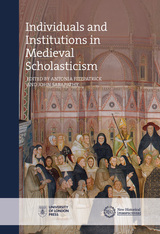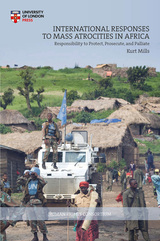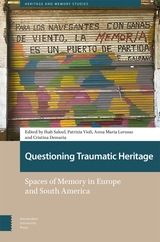223 scholarly books by University of London Press and 5
start with I
223 scholarly books by University of London Press and 5
223 scholarly books by University of London Press
5 start with I start with I
5 start with I start with I

In Protest
150 Poems for Human Rights
Edited by Helle Abelvik-Lawson, Anthony Hett, and Laila Sumpton
University of London Press, 2013
In Protest: 150 Poems for Human Rights is an anthology of new poetry exploring human rights and social justice themes. This collection, a collaboration between the Human Rights Consortium at the School of Advanced Study, University of London, and the Keats House Poets, brings together writing that is often very moving, frequently touching, and occasionally humorous. The 150 poems included here come from over 16 countries, and provide a rare insight into experiences of oppression, discrimination, and dispossession - and yet they also offer strong messages of hope and solidarity. This anthology brings you contemporary works that are truly outstanding for both their human rights and poetic content. Arranged across thirteen themes - Expression, History, Land, Exile, War, Children, Sentenced, Slavery, Women, Regimes, Workers, Unequal, and Protest - you will find within this collection a poem that inspires and engages you.
[more]

Independence and Revolution in Spanish America
Perspectives and Problems
Edited by Eduardo Posada-Carbo and Anthony McFarlane
University of London Press, 1999
The essays in this volume re-examine, from a number of different angles the process of Independence in Spanish America. The focus is to a large extent on the consequences of the wars of Independence for the newly established republics. However the first section deals with a critical review of the historiography the ‘revolutionary’ nature of Independence and the comparative elements of Independence in the Americas. The remainder of the book examines the development of the wars and the impact that Independence had on political instability culture citizenship and the formation of new nations. In addition to general chapters there are individual chapters devoted to New Granada Venezuela Mexico Chile and Argentina.
[more]

Individuals and Institutions in Medieval Scholasticism
Edited by Antonia Fitzpatrick and John Sabapathy
University of London Press, 2020
Individuals and Institutions in Medieval Scholasticism is one of the first pieces of close exploratory scholarship on the fundamental relationship between medieval scholastic thought, individual scholars, and their institutions. The text revolves around these essential questions: What was the relationship between particular intellectuals and their wider networks (including but not limited to “schools”), how did intellectuals shape their institutions, and how were their institutions shaped by them? This theoretically sophisticated collection uses a range of European methodological approaches to address a variety of genres such as commentaries, quodlibetal questions, polemics, epic poetry, and inquisition records, and a range of subject matter including history, practical ethics, medicine, theology, philosophy, the constitution of religious orders, the practice of confession, and the institution of cults. This book will be an important reference point for medieval historians, while also raising questions relevant to those working on individualization and institutionalization in other periods and disciplines.
[more]

Intercultural and Intertextual Encounters in Michael Roes's Travel Fiction
Seiriol Dafydd
University of London Press, 2015
This book investigates a specific aspect of travel literature – the fictional travel novel – and one practitioner of that sub-genre – the contemporary German author Michael Roes (b. 1960). The analysis focuses on two main areas of research. The first concerns Roes’s representation of intercultural encounters: how does Roes conceive and present an encounter between representatives of different cultures? And what constitutes a successful encounter, if such a thing exists? The second area of interest in this study concerns Roes’s intertextual methodology. This study identifies those intertextual references that are of greatest significance and examines how and why Roes refers to other writers and their texts as he composes his own. Finally, this study identifies whether a connection exists between Roes’s engagement with interculturality in all its facets on the one hand and his utilization of intertextuality on the other. In each case the intertextual processes underpinning the novels are shown to be a vital element in the way Roes approaches questions that fascinate above all contemporary European society and dominate the media: questions regarding identity, (homo-)sexuality, race and racism, gender, and relations between the West and Islam.
[more]

International Responses to Mass Atrocities in Africa
Responsibility to Protect, Prosecute, and Palliate
Kurt Mills
University of London Press, 2015
Since the end of World War II and the founding of the United Nations, genocide, crimes against humanity, and other mass atrocities have been explicitly illegal. When such crimes are committed, the international community has an obligation to respond, which has come to be known as “the responsibility to protect.”
Parallel to this responsibility, two related responsibilities have developed: to prosecute those responsible for the crimes, and to provide humanitarian relief to the victims—what Kurt Mills in this book calls the “responsibility to palliate.” While this rhetoric of protection is well used by the international community, its application in practice has been erratic at best. In International Responses to Mass Atrocities in Africa, Mills develops a typology of responses to mass atrocities, considering four cases in Rwanda, the Democratic Republic of the Congo, Uganda, and Darfur. Putting the cases into historical context and analyzing them according to this typology, Mills investigates the limitations of these responses and calls for such responses to be implemented in a more timely and thoughtful manner. Mills provides critical analysis of the possibilities for the international community to respond to humanitarian crises in the future.
Parallel to this responsibility, two related responsibilities have developed: to prosecute those responsible for the crimes, and to provide humanitarian relief to the victims—what Kurt Mills in this book calls the “responsibility to palliate.” While this rhetoric of protection is well used by the international community, its application in practice has been erratic at best. In International Responses to Mass Atrocities in Africa, Mills develops a typology of responses to mass atrocities, considering four cases in Rwanda, the Democratic Republic of the Congo, Uganda, and Darfur. Putting the cases into historical context and analyzing them according to this typology, Mills investigates the limitations of these responses and calls for such responses to be implemented in a more timely and thoughtful manner. Mills provides critical analysis of the possibilities for the international community to respond to humanitarian crises in the future.
[more]
READERS
Browse our collection.
PUBLISHERS
See BiblioVault's publisher services.
STUDENT SERVICES
Files for college accessibility offices.
UChicago Accessibility Resources
home | accessibility | search | about | contact us
BiblioVault ® 2001 - 2024
The University of Chicago Press









